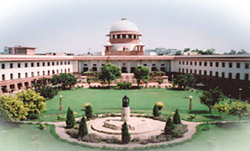 Indian Kanoon is a free search engine for Indian law, providing access to more than 1.4 million central laws, and judgments from The Supreme Court of India, 24 High Courts, 17 law tribunals, constituent assembly debates, law commission reports, and a few law journals.
Indian Kanoon is a free search engine for Indian law, providing access to more than 1.4 million central laws, and judgments from The Supreme Court of India, 24 High Courts, 17 law tribunals, constituent assembly debates, law commission reports, and a few law journals.
The development of Indian Kanoon began in the summer of 2007 and was publicly announced on 4 January 2008. Developing this service was a part-time project when I was working towards my doctorate degree in Computer Science at the University of Michigan under of guidance of Professor Farnam Jahanian of Arbor Networks fame. My work on Indian Kanoon continues to be a part-time affair because of my full-time job at Yahoo! India (Bangalore). Keep in mind, however, that I don’t have a law background, nor am I an expert on information retrieval. My PhD thesis is entitled Context-Aware Network Security.
The Genesis
Indian Kanoon was started as a result of my curiosity about publicly available law data. In a blog article, Indian Kanoon – The road so far and the road ahead, written a year after the launch of Indian Kanoon, I explained how the project was started, how it ran during the first year, and the promises for the next year.
When I was considering starting Indian Kanoon, the idea of free Indian law search was not new. Prashant Iyengar, a law student from NALSAR Hyderabad,  faced the same problem. The law data was available but the search tools were far from satisfactory. So he started OpenJudis to provide search tools for Indian law data that were publicly available. He traces the availability of government data and the development of OpenJudis in detail in his VoxPopuLII post, Confessions of a Legal Info-holic.
faced the same problem. The law data was available but the search tools were far from satisfactory. So he started OpenJudis to provide search tools for Indian law data that were publicly available. He traces the availability of government data and the development of OpenJudis in detail in his VoxPopuLII post, Confessions of a Legal Info-holic.
Prashant Iyengar traces the genesis, successes, and impacts of Indian Kanoon in a more detailed fashion in his 2010 report, Free Access to Law in India – Is it Here to Stay?
The Goal
I have to make it clear that Indian Kanoon was started in a very informal fashion; the goals of Indian Kanoon were not well established at the outset. The broadest goal for the project came to me while I was writing the “About” page of Indian Kanoon. From this point on, the goals for Indian Kanoon started to crystallize. The second paragraph of this page summed it up as follows:
 “Even when laws empower citizens in a large number of ways, a significant fraction of the population is completely ignorant of their rights and privileges. As a result, common people are afraid of going to police and rarely go to court to seek justice. People continue to live under fear of unknown laws and a corrupt police.”
“Even when laws empower citizens in a large number of ways, a significant fraction of the population is completely ignorant of their rights and privileges. As a result, common people are afraid of going to police and rarely go to court to seek justice. People continue to live under fear of unknown laws and a corrupt police.”
The Legal Thirst
During the first year after the launch of Indian Kanoon, one constant doubt that lingered in the minds of everyone familiar with the project (including me) concerned just how many people really needed a tool like Indian Kanoon. After all, this was a very specialized tool, which quite possibly would be useful only to lawyers or law students. But what constantly surprises me is the increasing number of users of the Website. Indian Kanoon now has roughly half a million users per month, and the number keeps growing.
The obvious question is: Why is this legal thirst — this desire for access to full text of the law — arising in India now? I can think of umpteen reasons, such as an increase in the number of Indian citizens getting on the Internet, which is proving to be a better access medium than libraries; or that the general media awareness of law, or the spread of blogging culture, is fueling this desire.
On further reflection, I think there are two main drivers of this thirst for legal information. The first one is the resources now available for free and open access to law. Until very recently, most law resources in India were provided by libraries or Websites that charged a significant amount of money. In effect, they prohibited access to a significant portion of the population that wanted to look into legal issues. The average time spent per page on the Indian Kanoon Website is six minutes; this shows that most users actually read the legal text, and apparently find it easier to understand than they had previously expected. (This is precisely what I discovered when I began to read legal texts on a regular basis.)
The spread of the Internet, considered by itself, is not an important reason for the current thirst for law in India, in my view. Subscription-based legal Websites have been around for a while in India, but because of the pay-walls that they erected, none of them has been able to generate a strong user base. While the open nature of the Internet made it easy to compete against these providers, the availability of legal information free of charge — not just availability of the Internet — has removed huge barriers, both to start ups, and to access by the public.
The second major reason for this thirst for legal information — and for the traffic growth to Indian Kanoon — lies in technological advancement. Government websites and even private legal information providers in India are, generally, quite technologically deficient. To provide access to law documents, these providers typically have offered interfaces that are mere replicas of the library world. For example, our Supreme Court website allows searching for judgments by petitioner, respondent, case number, etc. While lawyers are often accustomed to using these interfaces, and of course understand these technical legal terms, requiring prior knowledge of this kind of technical legal information as a prerequisite for performing a search raises a big barrier to access by common people. Further, the free-text search engines provided by these Websites have no notion of relevance. So while the technology world has significantly advanced in the areas of text search and relevance, government-based — and, to some extent, private, fee-based — legal resources in India have remained tied to stone-age technology.
requiring prior knowledge of this kind of technical legal information as a prerequisite for performing a search raises a big barrier to access by common people. Further, the free-text search engines provided by these Websites have no notion of relevance. So while the technology world has significantly advanced in the areas of text search and relevance, government-based — and, to some extent, private, fee-based — legal resources in India have remained tied to stone-age technology.
Better Technology Improves Access
Allowing users to try and test any search terms that they have in mind, and providing a relevant set of links in response to their queries, significantly reduces the need for users to understand technical legal information as a prerequisite for reading and comprehending the law of the land. So, overall, I think advances in technology, some of which have been introduced by Indian Kanoon, are responsible for fostering a desire to read the law, and for affording more people access to the legal resources of India.
The Road Ahead
Considering, however, that fear of unknown laws remains in the minds of large numbers of the Indian people, now is not the time to gloat over the initial success of IndianKanoon. The task of Indian Kanoon is far from complete, and certainly more needs to be done to make searching for legal information by ordinary people easy and effective.
Sushant Sinha runs the search engine Indian Kanoon and currently works on the document processing team for Yahoo! India. Earlier he earned his PhD in Computer Science from the University of Michigan under the guidance of Professor Farnam Jahanian. He received his bachelor and masters degrees in computer science from IIT Madras, Chennai and was born and brought up in Jamshedpur, India. He was recently named one of “18 Young Innovators under 35 in India” by MIT’s Technology Review India.
VoxPopuLII is edited by Judith Pratt. Editor in chief is Robert Richards.





